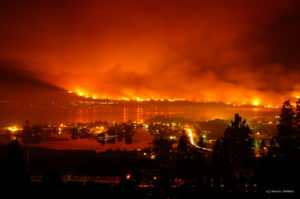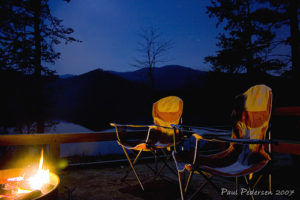Wildfires – How to Prevent Them – How to Report Them
 British Columbia is four times the size of the United Kingdom and larger than any US state, excluding Alaska. Almost two-thirds of the province is forested (43% is old growth) and it offers visitors a woodland wonderland of outdoor hiking and camping opportunities.
British Columbia is four times the size of the United Kingdom and larger than any US state, excluding Alaska. Almost two-thirds of the province is forested (43% is old growth) and it offers visitors a woodland wonderland of outdoor hiking and camping opportunities.
However, we all have to do our best to protect it especially during the long, dry summer months we enjoy in BC.
It’s easy to think that wildfires are an act of nature, something out of our control. And, as tourists we often don’t even think about them at all – unless they impact our vacation. But, the other day I was thinking about taking a trip to the Okanagan and staying at the Accent Inns in Kelowna and Kamloops and remembered the Okanagan Mountain Park Wildfire which took place in 2003. I remember it well as my 18-year old son went to help fight it. Scary times for us parents, but we were also proud of him. That was the biggest interface wildfire event in the province’s history covering 256 square kilometres.
That got me thinking about how many fires are caused by people just like us who forget to extinguish a campfire properly, or absent-mindedly flick a cigarette butt out of our car window. Over the last 10-years the average is almost 40 percent!
This year alone 543 wildfires (April 1, 2016 to July 20) have burned 936 square kilometres. This means that approximately 217 fires have been caused by simple carelessness, especially with campfires. Here’s a list supplied by the BC government to remind us of how to do our bit in preventing our campfire from turning into a wildfire.
- Check current campfire restrictions for your area
- Select your campsite and campfire location carefully
- Remove all leaves, twigs and other flammable material from the area around where you plan to light your campfire
- Never have a campfire when it’s windy
- Choose a proper fire pit or make a ring of rocks at least three metres from trees, shrubs, structures and debris
- Do not leave a campfire unattended for ANY amount of time
- Keep a bucket of at least eight litres of water close by the fire at all time, and/or a hand tool (such as a shovel) to extinguish the fire properly
- Completely extinguish your campfire before you go to sleep or leave the area for any period of time.
- To extinguish your campfire, pour plenty of water on the fire and surrounding area, dousing the site of the campfire thoroughly. Stir the campfire until there are no embers and the ashes are cold to the touch.
 Other Fire Prevention Considerations
Other Fire Prevention Considerations
- Do not discard smoking materials from vehicles. Always use interior ashtrays.
- Motorized vehicles, particularly All-Terrain Vehicles (ATVs) and dirt bikes, can produce a significant amount of heat from their exhaust systems. This heat can be enough to spark a wildfire. Avoid operating any motorized vehicle in tall grass and vegetation when the weather is hot and dry.
To report a wildfire or irresponsible behaviour call 1 800 663-5555 or *5555 from a cell phone. Here are some of the things you can take note of that will really help the operator.
- Location: Where is the fire? How far up the hillside?
- Size: Metres? Hectares? Size of a house? Size of a football field?
- Rate of spread: How quickly is the fire spreading?
- Fuel: What’s burning? Grass, bushes, trees?
- Smoke/flames: What colour is the smoke? Are flames visible?
- Threat: Are there any people or buildings at risk?
- Action: Is anyone fighting the fire?
And don’t forget, if you are camping and would like a little luxury at the end of your trip, book into an Accent Inns or Hotel Zed and relax for a few days. They have irons and ironing boards in every room, coin-op laundries and same day Valet dry cleaning service to freshen up all those clothes that have been crammed into your backpacks for the last week or so! That should get you all fired up!
Mike Wicks
Blue Beetle Creative